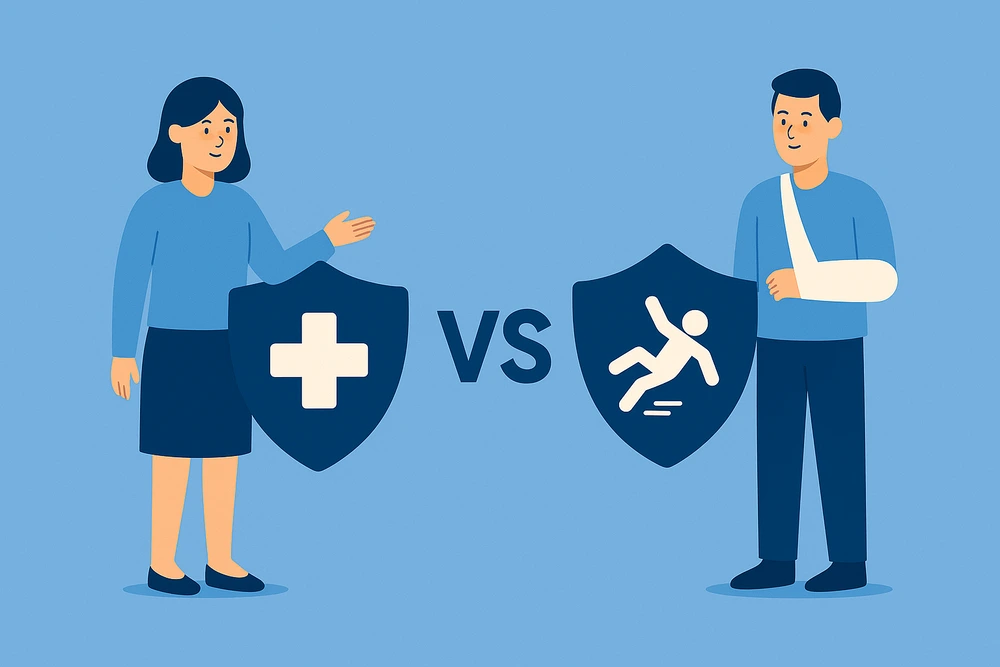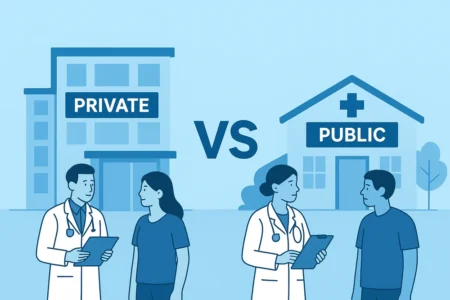Table of Contents
Businesses in India are building the “ideal workplace” to meet the evolving needs of employees and stay relevant in an increasingly competitive landscape. They are leveraging employee benefits to attract and retain top talent. Among the top employee benefits offered in India are health and wellness benefits. These benefits do more than just meet compliance; they are a powerful business tool to attract new hires, retain employees, and build a solid reputation.
As employee benefits become more inclusive and comprehensive, traditional components like Group Medical Coverage (GMC) also evolve. Two other areas in healthcare benefits are gaining traction, namely, Group Personal Accident (GPA) and Group Term Life (GTL) insurance. Historically, these benefits were seen as either add-ons to a basic health insurance package or completely irrelevant. But now they are emerging as an integral part of a comprehensive employee wellness strategy.
According to the Mercer Marsh Health Trend Report 2024, employer-sponsored health insurance is expected to experience an 11% increase in spending. Furthermore, 57% of insurers across the globe expect employers to seek plan improvements instead of cost-cutting measures that limit coverage. This shift marks the importance of making employee healthcare benefits more useful and effective.
This brings us to the looming question: how can fast-growing startups and SMEs in India offer comprehensive health benefits without breaking the bank? Read this blog as we break down the two most common components of employee health benefits — Group Medical Coverage (GMC) and Group Personal Accident Insurance (GPA). Learn all about their respective use cases and key differences to decode the ultimate way to construct a health benefit package for your team.
Also read: Group Health Insurance for Employees
What Is Group Medical Coverage (GMC)?
Group Medical Coverage (GMC), also known as Group Health Insurance, is the most commonly offered health benefit in India. GMC provides coverage to employees and their dependents for hospitalisation expenses, day-care treatments, and other medical expenses. The policy premium is usually paid by the employer and is renewable till the employment period. GMC is an extremely critical financial protection for the employees as it covers them in medical emergencies and reduces their out-of-pocket expenses.
Employers offer group health cover to boost retention, improve business productivity, and attract new hires. Here are some more benefits that make GMC a value-addition to your organisation’s employee benefits toolkit:
Benefits of Group Medical Coverage (GMC)?
- Comprehensive Coverage: GMC offers coverage for hospitalisation, treatment, diagnostics, room rent, ambulance, etc.
- Tax Relief: Both employers and employees can claim tax deductions for insurance premiums under Section 37(1) and Section 80D, respectively.
- Family Protection: Most GMC plans include coverage for family members, including spouse, children, and parents.
- No Waiting Period: Unlike individual health insurance, coverage for pre-existing diseases in GMC starts from day one.
- Attracts & Retains Top Talent: A solid GMC policy attracts top talent and retains employees.
GMC Coverage: What’s Included and Excluded?
Inclusions:
- Hospitalisation
- Day-care treatment
- Pre and post-hospitalisation expenses
- Pre-existing diseases
- Domicilary hospitalisation
- Cashless treatment
- Maternity benefits (optional)
- COVID-19 and seasonal illness coverage
Exclusions:
- Cosmetic or elective surgeries
- Alternative treatment (like AYUSH, homeopathy, etc.)
- Injuries due to self-harm or substance abuse
- Diagnostics or OPD charge without hospitalisation
- IVF treatment
- Non-medical expenses like registration fees, consumables
Quick read: Who are Eligible for Group Health Insurance?
What Is Group Personal Accident Cover (GPA)?
Group Personal Accident (GPA) provides financial coverage in the event of an accident that results in death or disability (both temporary and permanent) to employees. It differs from both Group Medical Cover and Group Term Life Insurance, as it covers hospitalisation and medical expenses only if the employee suffers injuries or death due to an accident.
Most high-risk industries like construction, logistics, or manufacturing offer GPA coverage to employees. Businesses also selectively offer GPA coverage to employees involved in high-risk job roles. However, owing to the increasing risks of accidents happening in daily work commutes, businesses are now offering it to all employees as part of a holistic health package.
Benefits of Group Personal Accident Coverage (GPA)?
- Financial Protection for Accidental Injuries & Death: Employees and their families get a lump sum payout in case of an accidental death or disability. The payout provides the essential financial protection in an already stressful time.
- Temporary Total Disability Benefit: In case the employee experiences a temporary disability that prevents them from working, GPA provides weekly compensation to make up for the loss of income during their recovery.
- Permanent Partial Disability Benefit: In case an employee suffers a permanent loss of a body part (like loss of a limb or eyesight), they get compensated under the GPA insurance.
- OPD & Rehab Coverage: Most insurers also give coverage for OPD and rehab expenses to ensure a speedy recovery.
- Boosts Morale & Retention: Accidents can be debilitating for families as the trauma suffered can leave a lasting impact. For employees, knowing that their families are protected in case of an accidental loss or injury can bring peace of mind and boost morale and loyalty to their employer.
GPA Coverage: What’s Included and Excluded?
Inclusions:
- Accidental death
- Permanent total disability
- Permanent partial disability
- Temporary total disability
- Repatriation of mortal remains
- Education of children
- Rehab & OPD expenses
- Ambulance charges
Exclusions:
- Death by suicide or self-inflicted injuries
- Accidents under the influence of alcohol/drugs
- Participation in dangerous sports or activities
- Pre-existing medical conditions
- War or nuclear perils
Recommended read: Difference Between Group and Individual Health Insurance
7 Differences Between GMC and GPA Insurance Policy: A Comparative View
| Feature | GMC | GPA |
| Customisation | Highly customisable with optional maternity, dental, and OPD covers | Moderate customisation – often based on salary or job roles |
| People Covered | Employee + Dependents (spouse, children, parents) | Only employee |
| Coverage Type | Covers medical treatments and hospitalisation | Covers only accidental injuries or death |
| Scope of Coverage | Comprehensive: surgery, maternity, OPD, etc. | Only for accidental death or disability |
| Key Inclusions | Pre & post-hospitalisation, daycare, maternity (optional) | Accidental death, disability, ambulance cover |
| Key Exclusions | Cosmetic treatments, elective surgeries and non-medical expenses | Self-inflicted harm, accidents under the influence |
| Ideal For | All companies are looking for standard health benefits | High-risk sectors like manufacturing, logistics and construction |
The reason why most organisations offer both GMC and GPA insurance in combination is because they can offer holistic protection to employees and save lakhs in future costs.
Factors That Employers Should Consider Before Opting For Health Benefits
While GPA is purely optional and GMC is a non-negotiable business expense for teams of more than 21 people, here are some factors to consider before deciding on the health benefits for your team:
1. Nature of Work & Risk Exposure
While GMC is the primary benefit for white-collar desk jobs, GPA serves a critical role in mitigating risk in work environments where the threat to physical safety is higher. GPA is non-negotiable for workers in logistics and delivery, warehouse, and industrial roles. In some cases, employers also provide GPA coverage for white-collar employees who do an extensive commute for work.
2. Employee Demographics
A younger and dynamic workforce with fewer dependents may value GPA more, especially if they commute long distances for work or travel often. An older or diverse team may benefit more from a comprehensive GMC coverage that addresses their varied healthcare needs.
3. Scope & Benefits
While GPA provides protection only in case of accidents, GMC covers a broader scope, including lifestyle diseases, surgeries, and childbirth. If you aim to promote long-term employee well-being, GMC is the foundational layer. GPA is better viewed as an additional safety net.
4. Budget & Cost Consideration
GPA is often more cost-effective than GMC. If your startup or small business has budget constraints, you might start with GPA to provide at least basic coverage and add GMC as your team scales.
5. Legal & Compliance Requirements
Some businesses require GPA insurance by law, specially those in high-risk industries, the ones with blue-collar workers, and the ones that hire on contract, like delivery personnel or driver partners. GMC is also mandatory for businesses with more than 20 employees, regardless it is a good baseline employee benefit that attracts and retains talent and helps build a competitive comp package.
6. Customisation
GPA offers little to no plan customisation as it is purely a coverage against accidental claims. However, businesses can configure the GPA insurance features like sum insurance, education coverage benefits, modification (home and vehicle) benefits for their teams, depending on risk levels and job roles.
GMC, on the other hand, offers more room for customisations with wellness benefits, health check-ups, maternity care, fertility care, mental health support, among some of the many features to pick from. A well-constructed GMC coverage can do a lot of the heavy lifting to support your holistic wellness goals.
Suggested read: 7 Ways Onsurity Empowers Mid-Sized Businesses with Employee Health Benefits
Customise A Holistic Health Benefit Package With Onsurity
Both GMC and GPA policies play unique roles in protecting your workforce. If you’re serious about building a modern, inclusive, and caring workplace, a basic health insurance plan isn’t enough. For most businesses, a combination of both GMC and GPA is the way forward, offering a solid foundation and complete 360-degree protection.
However, the right choice for your team depends on their risk profile, age group, expectations, and, of course, budget. But the real differentiator is how well the policy is tailored for your people and your business.
That’s where Onsurity comes in. Whether you’re a 10-member startup or a 1000-strong enterprise, our digital-first platform helps businesses customise, manage, and scale employee insurance plans effortlessly — all under one roof.
Onsurity’s flexible and customisable health and wellness benefits are highly valuable for businesses looking to scale rapidly without compromising on culture and compliance. With the monthly subscription plans, employers can renew benefits as required.
Wondering how Onsurity can power your employee benefits strategy? Request a quote today!
FAQs:
1. What is the meaning of an off-duty GPA?
An off-duty GPA covers accidents that happen outside of work, like during commutes, vacations, or at home. Given the rising safety threats, an off-duty GPA plan can ensure your employees are financially protected in and outside of work.
2. Is GPA Mandatory For All Employees?
GPA is not mandatory for all sectors, but for high-risk industries that involve more physical or travel-related threats, employers may be legally required to provide GPA coverage, specially if they hire contract workers.
3. When Should I Opt For GMC Insurance?
In India, businesses are mandated to provide a GMC coverage to teams of more than 20 people. So, if you have a rapidly growing team and you are looking to provide a basic healthcare benefit, GMC insurance should be your default offering.
4. Does GPA cover pre-existing diseases?
No, GPA does not cover medical coverage for pre-existing or critical diseases. It is purely an accidental coverage that covers medical or general expenses against accidents and accidental death of the insured employee.
5. Can a small business benefit from providing both GMC and GPA to employees?
With the right coverage and tailored plan, small businesses and startups can certainly ensure their teams’ financial protection against any unforeseen accident. Not only can it help attract and retain talent, but it can also save your business from any future financial liability.







